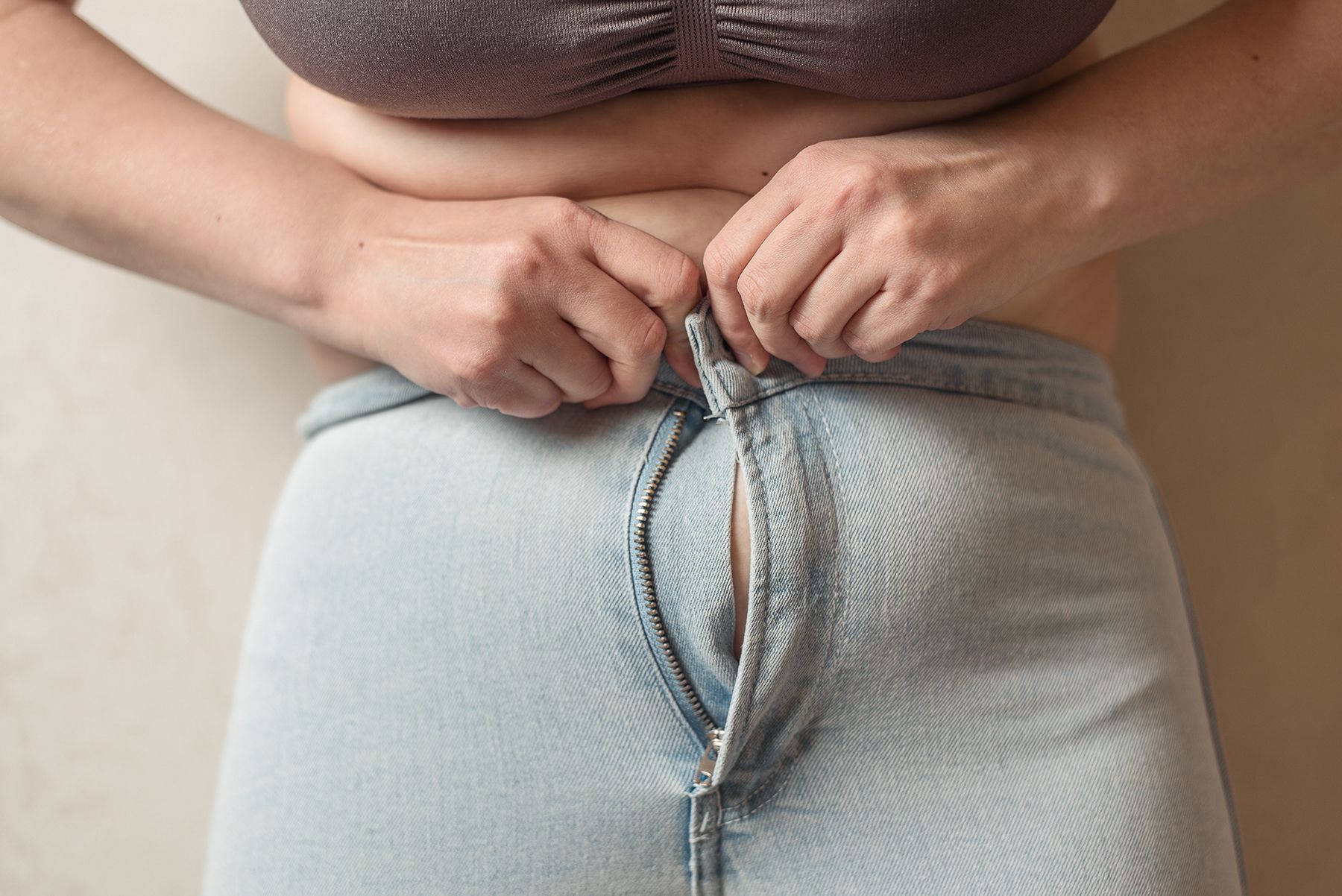The Top 10 Reasons Why You're Not Losing Weight | Kansas City Laser-Like Lipo
The Top 10 Reasons Why You're Not Losing Weight | Kansas City Laser-Like Lipo

Photo Credit: Shutterstock
The Top 10 Reasons Why You Are Not Losing Weight: Let’s be real, at Kansas City Laser-Like Lipo® we realize that losing weight can be a real challenge: it takes hard work, dedication, and often involves making difficult choices. It's not easy to say "no" to that extra piece of cake or skip out on an after-work drink with friends. But if you want to see results, you must make the effort. The good news is that it's possible to develop healthy habits that will last a lifetime, and before you know it, you'll see the pounds come off. With just a little bit of hard work, dedication, and some self-discipline, anyone can reach their weight loss goals. So don't give up, focus on the long-term success, and make every effort to stay motivated and on track. Now, let’s get started!
After working with thousands of patients over the past 14 years in clinical practice, we have heard about the craziest ways that people have attempted to lose weight and we have seen the unfortunate side-effects that these methods have had on their victims. Diets, and especially FAD diets, are terrible and should be avoided at all costs, and we would advise against that random juice cleanse that you heard about from that “non-conformist” lady on the internet.
Fortunately, we have some simple solutions for effective weight loss that works for just about anyone, and we'll get to that later. However, here are the top 10 reasons that we have found in practice that simply keep people from effectively losing weight:
1. Eating Too Much:
This one is common sense but it's a vicious cycle, you eat too much, gain weight, and then your attempts to lose that weight by eating less don't work. You're stuck in this rut of overeating and under-losing because your body has become accustomed to the excessive calorie intake. Eating too much can lead to an inability to lose weight due to several factors.
For starters, when your body is used to having a certain number of calories, it will adjust its metabolic rate accordingly. This means that despite cutting back on the amount you eat, your metabolism won't speed up enough to burn off the extra fat quickly. The result is that even though you're eating less, the body is still not burning off the weight.
Also, when you're consistently eating more calories than your body needs, it's likely that you'll develop unhealthy cravings for sweet and fatty foods. This makes it difficult to stick to a healthy diet plan, as your taste buds will be fighting against it. Not only does this make it hard to lose weight, but it also prevents you from developing healthy eating habits.
Finally, overeating can sabotage your efforts at weight loss because of the increased stress levels it can cause. Stress triggers a hormone called cortisol, which tells your body to store fat as a way of preserving energy and protecting against future starvation. So, the more you eat, the higher your stress levels and the harder it will be to lose the extra weight.
In short, eating too much can lead to an inability to lose weight because it messes with your metabolism, encourages unhealthy eating habits and causes increased stress. The key is to find a balance between nourishing yourself without overeating
2. Not Eating Enough:
On the opposite side of the spectrum, you have those who simply don’t eat enough. Did you know that not eating enough can lead to weight gain? It’s true. The best way to stay slim and healthy is by maintaining a balanced diet, and not getting too few calories.
When there are fewer calories being consumed than the body needs, our metabolism will slow down as it attempts to conserve energy. This means that any excess calories from snacks or meals will be stored, instead of being burned off. All those extra calories can soon add up, leading to weight gain.
It’s important to remember that there are other health risks associated with not eating enough too. A lack of essential vitamins and minerals can lead to fatigue, dizziness, and even hair loss in extreme cases. So, if you’re looking to lose weight, make sure to eat enough of the right foods, your body will thank you for it.
3. Not Exercising Enough or the Wrong Types of Exercise:
If you’re having trouble losing weight, it could be due to a lack of exercise or the wrong type of exercise. Research has shown that physical activity is essential for burning calories and maintaining a healthy weight. However, if you’re not doing enough, or doing the wrong kinds of exercises, then your efforts may not be enough to help you reach your goal.
First, let’s talk about not doing enough exercise. If you’re not exercising regularly, then your body will be burning fewer calories than it needs to lose weight. This is because physical activity helps the body burn more calories, meaning that if you don’t do any, your body won’t be burning enough. To maximize the effectiveness of exercise, you should aim to work out at least 30 minutes a day, five days a week. However, starting out with walking each day for 30 minutes is a great way to get started that is easy for most people.
In addition to not doing enough exercise, it is also important to do the right type of exercises for weight loss. This means focusing on activities that help build muscle, like strength training, as well as cardio activities such as running or biking. Studies have shown that combining both types of exercise can help you burn more calories and lead to greater weight loss results. And for those who complain about having lose skin on their arms, legs, and mid-section, it’s crucial to incorporate some strength training to tone these specific areas of the body.
If you’re having trouble losing weight, it could be because you’re not doing enough physical activity or the wrong kind of activity. Look at your current exercise routine and make sure you’re doing enough cardio, strength training, and other activities that will help you burn more calories. Doing this can help put you back on track to reaching your weight loss goals.
4. Processed Food:
Processed food is the bane of any dieter's existence. No matter how hard you try to eat healthy, it can be so tempting to reach for a package of chips or a chocolate bar when hunger strikes, and that temptation could lead to weight gain. Here’s why: Processed foods are often filled with unhealthy fats and sugars, which can create an unhealthy calorie overload. Plus, processed food is often stripped of its natural fibers and vitamins, leaving you without the nutrients you need to stay healthy.
As if that weren’t enough, research has shown that eating processed foods high in fat or sugar can alter your taste buds so that you crave even more of those unhealthy items. So, if you want to avoid gaining weight, it’s best to avoid processed foods altogether or, at the very least, keep them to a minimum. Eating too much of this stuff can be a slippery slope and derail your health goals so quickly, so why not stick with whole foods that are loaded with nutrition and flavor? That way, you won’t have to worry about the dreaded weight gain that comes with eating processed food!
And, of course, it’s always helpful to remember: sometimes you just gotta “treat yo self.” So, if you’re really craving something processed, allow yourself an occasional indulgence, but do so with caution. Keep these snacks small and savor them, rather than chowing down on an entire bag of chips in one sitting. That way, you won’t have to worry about packing on the pounds!
At the end of the day, we all want to stay healthy and enjoy our food, so don’t forget to celebrate the joys of unprocessed eating every once in a while. Who knows? You may even discover a new favorite dish along the way! Just remember, if you want to avoid gaining weight, processed food is rarely a good choice. Stick with wholesome, natural options and your waistline will thank you.
5. Lack of Quality Sleep:
When it comes to losing weight, we've all heard the same advice, eat well and exercise regularly. But what about getting enough quality sleep? It turns out that a lack of quality sleep can have serious implications for your waistline!
Recent studies suggest that those who don't get enough good quality restful sleep are more likely to have higher body mass index (BMI) than those who do. This link is particularly strong in women, with research showing that those who sleep for fewer than 6 hours a night are 32% more likely to be obese.
It's thought that poor quality sleep can directly affect your metabolism and the hormones responsible for regulating appetite, namely ghrelin and leptin. If these hormones are out of balance, your appetite won't be regulated either and this can lead to overeating and weight gain.
Getting enough quality shut-eye is an essential part of any weight loss plan. So, turn off the screens, switch off the lights, and get ready for a good night's sleep. Aim for a good 7-8 hours of restful sleep, your waistline will thank you for it!
6. Stress:
It’s no surprise that stress can seriously impede weight loss efforts. After all, we’ve all heard the stories, and experienced, how much more easily it is to gain weight than lose it, and it’s hard not to think of our own struggles when the topic comes up. But what many don’t realize is that stress can be one of the main culprits behind this situation!
When we are under a lot of stress, our bodies tend to go into “survival mode.” The body tries to conserve as much energy as possible by slowing down processes like digestion, metabolism, and even fat burning. This means that any attempts at dieting or exercising will be less effective, you’ll be burning fewer calories, and your body won’t be metabolizing the food you eat as efficiently, leading to more weight gain.
But it gets worse: Stress also causes the body to release the hormone cortisol, which is linked to increased fat storage in the abdominal area. It’s a HUGE belly fat storage hormone. This means that not only are you gaining weight due to slowed metabolism and digestion, but you’re also likely storing that excess weight around your midsection. And as we all know, belly fat is one of the hardest types of fat to lose!
So, if you’ve been trying unsuccessfully to shed those extra pounds, take a look at how stress might be influencing your efforts. Make sure you manage stress levels through activities like yoga, meditation, deep breathing exercises, and positive self-talk. With these stress-busting techniques in your toolkit, you’ll be well on your way to achieving your weight loss goals!
7. Lack of Protein:
If you’re trying to lose weight but not getting anywhere, it could be because of a lack of protein in your diet. Protein is essential for building muscle and revving up your metabolism, which can help you burn more calories throughout the day. Without enough protein, fat loss can quickly come to a halt, and you might find yourself stuck in a rut.
It’s no secret that protein helps us feel full for longer, which can prevent us from overindulging and sabotaging our weight loss goals. Without the right amount of protein, it can be difficult to manage cravings and indulge responsibly while on a diet. Protein also helps control blood sugar levels, which can impact our food choices.
When you’re trying to lose weight, it’s important to eat quality protein sources such as lean meats, eggs, fish, and nuts. Aim for about 30 grams of protein per meal and include a source of protein in each snack. This will help ensure that your body is properly fueled and able to make the most of your diet and exercise program.
With a proper balance of protein, you can jump start your weight loss journey and get back on track! So don’t forget to include protein in every meal or snack, it’s an essential component for successful weight loss.
8. Hormonal Imbalances:
When it comes to weight loss, hormones play a huge role. If your hormones are out of balance, losing even a few pounds can seem like an impossible task. Have you ever tried dieting and working out for weeks on end with little to no results? Well, chances are you could be dealing with one or more hormonal imbalances that make it difficult (if not impossible) to slim down.
What exactly is going on here? Well, there are several hormones in the body that affect our metabolic rate, satiety levels and fat storage capacity, all of which impact our ability to lose weight. During periods of hormone imbalance these effects become magnified, making it tough to shed those unwanted pounds.
The hormones most likely to affect weight loss are insulin, cortisol, thyroid, and sex hormones such as testosterone. An imbalance in any of these can lead to an increase in body fat storage and/or a decrease in our ability to metabolize fat and carbohydrates, both of which make it harder for us to see results from dieting and exercise.
So, if you're feeling like no matter what you do the scale won't budge, look into possible hormonal imbalances that could be the culprit! If you suspect that your hormones might be out of whack, talk to your doctor about getting tested. With the right treatment plan tailored to address your specific imbalances, you should start seeing some progress soon enough. Just remember, don't lose hope!
9. Medical Conditions:
When it comes to weight loss, it’s not always as simple as picking up a few extra dumbbells and calling it a day. While exercise and eating healthy are still key components of any successful weight-loss program, there are certain medical conditions that can also impede progress. These conditions, from thyroid issues to sleep apnea, have the potential to throw your diet and exercise regimen off track if they’re not properly managed.
Hypothyroidism is one condition that can hold back weight loss success. The thyroid gland produces hormones that regulate metabolism, making hypothyroidism (when the body doesn't produce enough) a likely cause of stubbornly high weights on the scale. Other culprits include Cushing's syndrome, polycystic ovarian syndrome, depression, and anxiety. If a person is having trouble losing weight despite his or her best efforts, it may be beneficial to have their hormone levels tested.
Sleep apnea can also disrupt weight loss goals. This condition, which causes episodes of shallow breathing during sleep, has been linked to higher body fat percentage and increases in hunger hormones such as ghrelin. If a person suspects that they’re suffering from sleep apnea, it’s important that they seek medical attention right away in order to reduce the risk of further complications.
For those looking to lose weight and keep it off, addressing any underlying medical issues should be a top priority. From thyroid conditions and sleep apnea to medication side effects, understanding the impact that these can have on your efforts is key if you want to see lasting results.
10. Medications:
Ah, medications. They can be a real pain in the side for those of us trying to keep our weight in check, quite literally! Many medications come with common side effects such as appetite stimulation or decreased metabolism, making it difficult to lose weight. Here’s a look at how some of these drugs might be standing between you and your goal weight:
Antidepressants are one of the major culprits when it comes to hindering weight loss efforts. Selective serotonin reuptake inhibitors (SSRIs) specifically have been linked with an average weight increase of 5-10 pounds. That doesn't sound like much at first glance, but gaining that kind of extra baggage can really put a damper on any dieting attempts. While it's still unclear exactly why SSRIs cause weight gain, it could be related to their impact on the metabolism and how they affect your hunger hormones.
Another medication that may put a halt to successful weight loss is steroids. Corticosteroids like prednisone are used to reduce inflammation in the body, but they can also slow down your metabolic rate. This means that calories aren't burned off as quickly, making it harder for you to shed those extra pounds. And if that wasn’t enough, corticosteroid use has been linked with increased cravings for unhealthy foods too!
Finally, let’s not forget about birth control pills, even though they may improve some of the common side effects associated with hormonal imbalances, they can also result in weight gain. Due to their impact on hormones like estrogen and progesterone, certain birth control pills can increase appetite levels as well as retain more water in your body. It is possible to counteract these effects with a healthy diet and exercise plan, but it can still be an uphill battle.
At the end of the day, medications are essential for many people’s health and wellbeing, so don't be discouraged if you feel like your progress has stagnated due to drug use. Remember that there are always steps you can take to keep your weight loss goals on track! With proper care and attention, you can still reach your desired weight, even if you're taking medication.
In summary, at Kansas City Laser-Like Lipo® we realize that losing weight can be an arduous and lengthy process, it’s not a simple matter of reducing calories, but rather, it involves a multifaceted approach that incorporates healthy eating, physical activity, and even psychological support at times. From finding the motivation to make significant changes to navigating difficult-to-understand diets and exercise plans, losing weight can easily seem like an insurmountable challenge.
There are many physical and emotional obstacles that may get in the way of successfully reaching your goals, such as cravings for unhealthy foods or feeling overwhelmed by lifestyle changes. Additionally, our bodies are designed to resist drastic changes in diet or exercise, thereby making it even harder to stick with any plan or routine. Ultimately, losing weight demands both dedication and determination, two qualities that everyone should strive for to achieve their healthiest potential. I hope this article on The Top 10 Reasons Why You Are Not Losing Weight has been helpful! At Kansas City Laser-Like Lipo®, we are here to help in anyway that we can.











Share On: